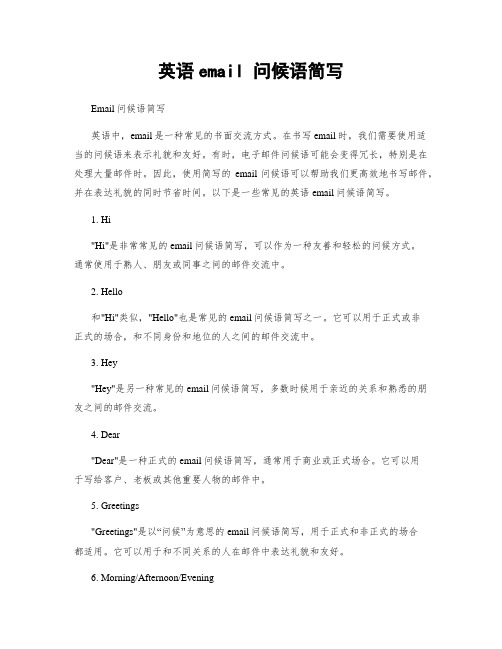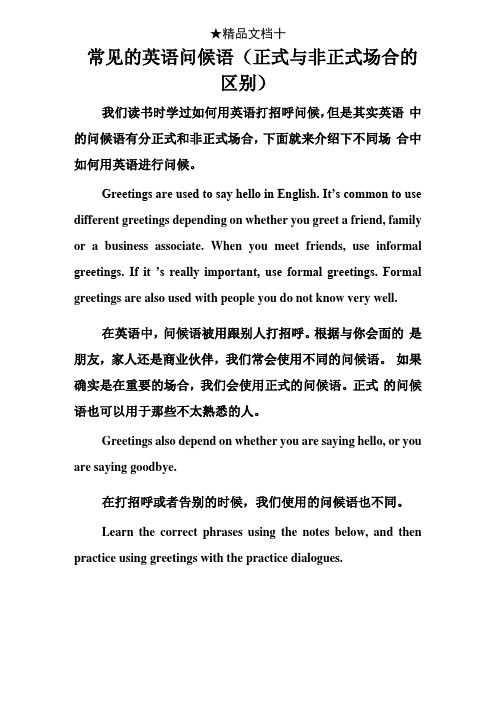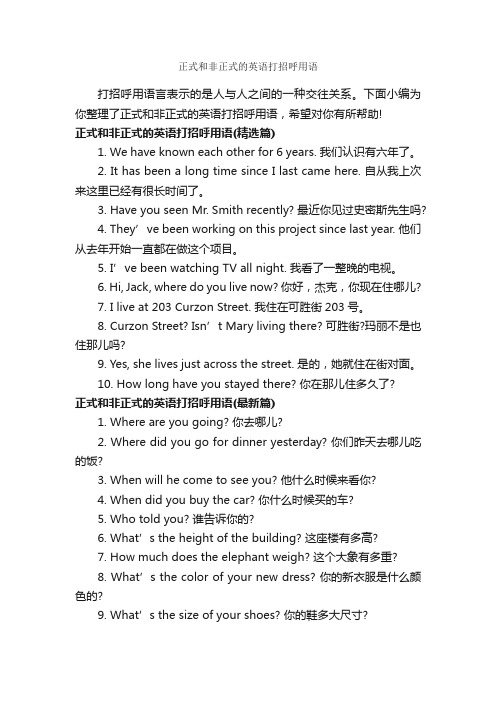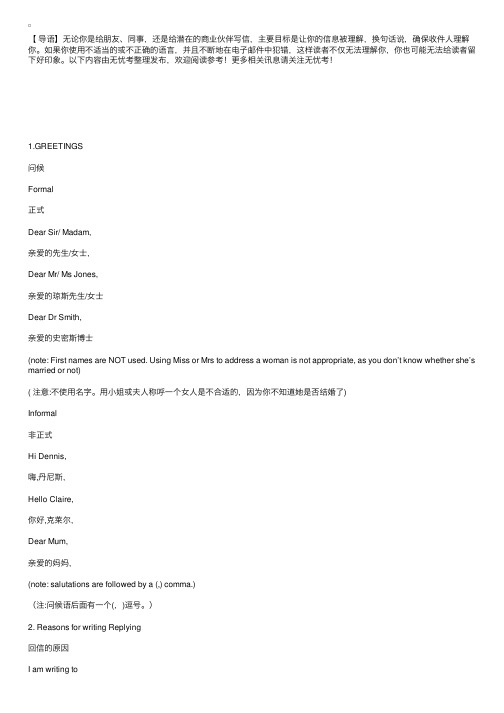英语正式与非正式打招呼(greetings)
英语email 问候语简写

英语email 问候语简写Email问候语简写英语中,email是一种常见的书面交流方式。
在书写email时,我们需要使用适当的问候语来表示礼貌和友好。
有时,电子邮件问候语可能会变得冗长,特别是在处理大量邮件时。
因此,使用简写的email问候语可以帮助我们更高效地书写邮件,并在表达礼貌的同时节省时间。
以下是一些常见的英语email问候语简写。
1. Hi"Hi"是非常常见的email问候语简写,可以作为一种友善和轻松的问候方式。
通常使用于熟人、朋友或同事之间的邮件交流中。
2. Hello和"Hi"类似,"Hello"也是常见的email问候语简写之一。
它可以用于正式或非正式的场合,和不同身份和地位的人之间的邮件交流中。
3. Hey"Hey"是另一种常见的email问候语简写,多数时候用于亲近的关系和熟悉的朋友之间的邮件交流。
4. Dear"Dear"是一种正式的email问候语简写,通常用于商业或正式场合。
它可以用于写给客户、老板或其他重要人物的邮件中。
5. Greetings"Greetings"是以“问候”为意思的email问候语简写,用于正式和非正式的场合都适用。
它可以用于和不同关系的人在邮件中表达礼貌和友好。
6. Morning/Afternoon/Evening根据时间段,我们可以使用简写的问候语来表示问候。
比如,"Morning"表示早上的问候,"Afternoon"表示下午的问候,"Evening"表示晚上的问候。
7. How are you?"How are you?"是一种常见的email问候语简写,用于询问对方的近况。
它可以用于和熟人、朋友或同事交流的邮件中。
8. Hope you're well"Hope you're well"是一种常用的email问候语简写,表示对对方的祝福和关心。
常见的英语问候语正式与非正式场合的区别

★精品文档十常见的英语问候语(正式与非正式场合的区别)我们读书时学过如何用英语打招呼问候,但是其实英语中的问候语有分正式和非正式场合,下面就来介绍下不同场合中如何用英语进行问候。
Greetings are used to say hello in English. It’s common to use different greetings depending on whether you greet a friend, family or a business associate. When you meet friends, use informal greetings. If it ’s really important, use formal greetings. Formal greetings are also used with people you do not know very well.在英语中,问候语被用跟别人打招呼。
根据与你会面的是朋友,家人还是商业伙伴,我们常会使用不同的问候语。
如果确实是在重要的场合,我们会使用正式的问候语。
正式的问候语也可以用于那些不太熟悉的人。
Greetings also depend on whether you are saying hello, or you are saying goodbye.在打招呼或者告别的时候,我们使用的问候语也不同。
Learn the correct phrases using the notes below, and then practice using greetings with the practice dialogues.利用下面的提示,学习正确的短语用法,然后利用下面的对话来练习问候语。
Formal Greetings:Arriving正式问候语:到达Good morning / afternoon / evening.早上好/中午好/晚上好Hello (name), how are you?嗨(人名),你好吗?Good day Sir / Madam (very formal)先生/太太日安(非常正式)Respond to a formal greeting with another formal greeting.使用正式问候语来回应Good morning Mr. Smith.早上好,史密斯先生。
正式和非正式的英语打招呼用语_宣传语大全_

正式和非正式的英语打招呼用语打招呼用语言表示的是人与人之间的一种交往关系。
下面小编为你整理了正式和非正式的英语打招呼用语,希望对你有所帮助!正式和非正式的英语打招呼用语(精选篇)1. We have known each other for 6 years. 我们认识有六年了。
2. It has been a long time since I last came here. 自从我上次来这里已经有很长时间了。
3. Have you seen Mr. Smith recently? 最近你见过史密斯先生吗?4. They’ve been working on this project since last year. 他们从去年开始一直都在做这个项目。
5. I’ve been watching TV all night. 我看了一整晚的电视。
6. Hi, Jack, where do you live now? 你好,杰克,你现在住哪儿?7. I live at 203 Curzon Street. 我住在可胜街203号。
8. Curzon Street? Isn’t Mary living there? 可胜街?玛丽不是也住那儿吗?9. Yes, she lives just across the street. 是的,她就住在街对面。
10. How long have you stayed there? 你在那儿住多久了?正式和非正式的英语打招呼用语(最新篇)1. Where are you going? 你去哪儿?2. Where did you go for dinner yesterday? 你们昨天去哪儿吃的饭?3. When will he come to see you? 他什么时候来看你?4. When did you buy the car? 你什么时候买的车?5. Who told you? 谁告诉你的?6. What’s the height of the building? 这座楼有多高?7. How much does the elephant weigh? 这个大象有多重?8. What’s the color of your new dress? 你的新衣服是什么颜色的?9. What’s the size of your shoes? 你的鞋多大尺寸?10. My brother is twice as tall as your sister. 我弟弟比你妹妹高一倍。
greeting的用法和例句

greeting的用法和例句
"greeting"是一个名词,用来描述打招呼或问候的行为或言辞。
这个词也可以指代问候的言辞或动作。
在英语中,"greeting"通常
用于正式或非正式场合,用来表示对他人的尊重和友好。
以下是一些关于"greeting"的例句:
1. When I entered the room, I was met with warm greetings from my colleagues.
2. It is customary to exchange greetings with the host when you arrive at a party.
3. The traditional greeting in that culture involves a bow and a handshake.
4. She offered a polite greeting to the new neighbors when they moved in.
5. The email should begin with a formal greeting,
followed by the body of the message.
除了作为名词使用外,"greeting"也可以用作动词的现在分词形式"greeting",表示正在打招呼或问候的行为。
例如,"She was greeting guests at the entrance to the event."。
英语学习:正式与非正式的电子邮件用语——从问候语到结束语

【导语】⽆论你是给朋友、同事,还是给潜在的商业伙伴写信,主要⽬标是让你的信息被理解,换句话说,确保收件⼈理解你。
如果你使⽤不适当的或不正确的语⾔,并且不断地在电⼦邮件中犯错,这样读者不仅⽆法理解你,你也可能⽆法给读者留下好印象。
以下内容由⽆忧考整理发布,欢迎阅读参考!更多相关讯息请关注⽆忧考!1.GREETINGS问候Formal正式Dear Sir/ Madam,亲爱的先⽣/⼥⼠,Dear Mr/ Ms Jones,亲爱的琼斯先⽣/⼥⼠Dear Dr Smith,亲爱的史密斯博⼠(note: First names are NOT used. Using Miss or Mrs to address a woman is not appropriate, as you don’t know whether she’s married or not)( 注意:不使⽤名字。
⽤⼩姐或夫⼈称呼⼀个⼥⼈是不合适的,因为你不知道她是否结婚了)Informal⾮正式Hi Dennis,嗨,丹尼斯,Hello Claire,你好,克莱尔,Dear Mum,亲爱的妈妈,(note: salutations are followed by a (,) comma.)(注:问候语后⾯有⼀个(,)逗号。
)2. Reasons for writing Replying回信的原因I am writing to我写信是to make a reservation为了预约to apply for the position of为了申请这个职位to confirm my booking为了确认我的预约to ask for further information about…为了咨询更多的有关信息With reference to our telephone conversation on Friday, I would like to let you know that…根据周五我们的电话交谈,我想让你知道…3. Making a request提出请求Asking for information询问情况Could you please let me know你能告诉我...if you can attend…你是否参加…if you are available for a meeting on 12th December?你是否可以在12⽉12⽇开会?Could you possibly arrange a meeting with the Logistics Manager?你能安排⼀次与物流经理的会议吗?I would also like to know if there are any swimming pools in your areas.我还想知道你们地区是否有游泳池。
用英语打招呼的不同方式

用英语打招呼的不同方式用英语打招呼的不同方式我们用不同的方式打招呼,这取决于我们使用的语言是正式的还是非正式的。
当到达某地时,用正式的方式打招呼时我们会倾向于说:“good morning”(早上好), “good afternoon” (下午好)或者“good evening”(晚上好)。
当我们用非正式的打招呼方式时,我们倾向于说“hi”(你好);“hello”(你好);“how are you”(你好吗);“what's up”(你好吗);“how are you today”(你今天怎么样);“how come I never see you”(为什么我从没见过你);“it's been such a long time”(已经过了很久了);“long time no see”(好久不见);“where have you been hiding”(你躲到哪里去了)和“it's been ages since we last met”(自我们上次见面有些时日了)。
这里是一些朋友们互相打招呼的典型脚本:Paolo and Daren meet but Helli joins them later (Paolo和Daren相遇了,但是之后Helli加入了他们)Daren: Hello Paolo, what's up?(你好,Paolo,你好吗?)Paolo: Hi Daren, how're you doing?(你好,Daren,你最近怎么样?)Daren: I'm alright, and yourself?(我很好,你呢?)Paolo: I'm good, work is keeping me busy.(我很好,工作让我很繁忙。
)Daren: That's good, I can't complain either.(那很好,我一定不会抱怨的。
英语正式打招呼用语

英语正式打招呼用语2. I came here when I was 我二十岁来这儿。
3. I started school at the age of 我六岁开始上学。
4. My father is over 60 years old. 我父亲已年过六十了。
5. Most of them are less than 他们中大多数不到30岁。
6. I guess he’s about 我猜他大概30岁。
7. She’s going to be 15 next month. 下个月她就满15了。
8. They’ll have a party for their 10th wedding anniversary. 他们将为结婚十周年开个晚会。
9. He’s still a boy after all. 他毕竟还只是个孩子。
10. Are you watching TV now? 你在看电视吗?英语正式打招呼用语(最新篇)1. Yes, I’m watching Channel 是的,我在看5频道。
2. No, I’m listening to the radio. 没有,我在听收音机。
3. Where are you going? 你去哪儿?4. I’m going to work. 我去上班。
5. Who are you writing to? 你在给谁写信?6. I’m writing to an old friend. 给一个老朋友。
7. What will you do this weekend? 这周末你将干什么?8. I’ll go to a concert. 我要去听音乐会。
9. I’ll go on an outing with some friends. 我与朋友去郊游。
10. Do you like traveling? 你喜欢郊游吗?11. Yes, I like it a great deal/it very much. 是的,我很喜欢。
英语中常见的问候语

Introduction (first) Greeting:
初次⻅见面面的问候
How do you do?
你好
Fine / Great (informal)
不错(非非正式)
What's up?
怎么了?
Not much.
没什么。
I'm just (watching TV, hanging out, cooking dinner, etc.)
我只是在(看电视,出去玩,做晚饭等等)
Informal Greetings - After a Long Time
你妹妹好吗?
Anna: Oh, fine. Not much has changed.
哦,不错。她没怎么变样。
Tom: Well, I have to go. Nice seeing you!
好的,我要走走了。⻅见到你真高高兴!
Anna: Later.
回头⻅见。
Maria: Oh, hello Chris. How are you doing?
噢,你好克里里斯。最近怎么样?
Chris: I'm well. Thanks for asking. How are you?
很好。多谢关心心。你好吗?
Maria: I can't complain. Life is treating me well.
不错。我的日日子子过得很好。
Chris: That's good to hear.
- 1、下载文档前请自行甄别文档内容的完整性,平台不提供额外的编辑、内容补充、找答案等附加服务。
- 2、"仅部分预览"的文档,不可在线预览部分如存在完整性等问题,可反馈申请退款(可完整预览的文档不适用该条件!)。
- 3、如文档侵犯您的权益,请联系客服反馈,我们会尽快为您处理(人工客服工作时间:9:00-18:30)。
Informal greetings
• -How are you? • -Fine, thanks. And you? • -I'm fine, too.
Informal greetings
• • • • • • (1)What's up? 近来有什么事? (2)What's going on? 一切怎么样? (3)Hey, man. 嗨,兄弟。 (4)-How have you been? (近来怎么样? ) (5)-How are you doing ?/ How things are going? -Great. What about you?(很好,你呢?)
Return the greetings
• Alright Matt, how’s it going? Yeah, no trouble, how about you, alright? Yeah, not bad. • Hey Jane, how you doing? • Good thanks, and you?
Analysis of formal & informal greetings
Step 1: How to start a greeting
• Hey Jane, how you doing?
• Hi=hey<hello
• Alright Linken, how’s it going? Alright Carrie! How are you? • Alright ‘Alright mate!’
• ‘Fine, thanks!’一招走天下!源自 More expressions
• Yeah, not bad, not bad. Good, thanks!
• ‘alright, thanks!’ or ‘OK, thanks!’ ‘very well, thanks!’
Step 4: How to return the greetings
Comprehensive English Knowledge
Formal & Informal Greetings
• [common] How are you?
• How's it going? • What's up? • How’ve you been?
Formal greetings
• How do you do?(初次见面) • Glad/Nice to meet you! • -Glad/Nice to meet you, too.
Four greeting expressions
• • • • ‘Hello Linken!’ ‘Hi, Linken!’ ‘Hey Linken!’ ‘Alright Linken!’ or ‘Alright mate!’
Step 2: What’s going on next? 接下来问问人家过得怎么样!
• • • •
Hello! Hi! Hey! Alright! How are you? How you doing? How you going? How’s it going? You alright?
• • • • •
Good, thanks! Fine, thanks! Not bad, not bad! Alright, thanks! I’m OK! And you? How about you? What about you?
Common expressions
• How are you?
• Hello Linken, you alright? (Are you alright?)
Common expressions
• Hey Jane, how you doing?
• How you doing?
Common expressions
• How you going?
• Alright Carrie, how are you? Yeah, I’m fine, how you going?
Common expressions
• How’s it going?
• Alright Matt, how’s it going?
Step 3: How to respond?
